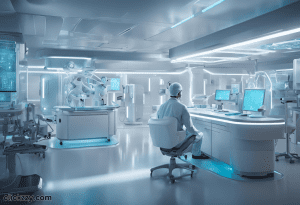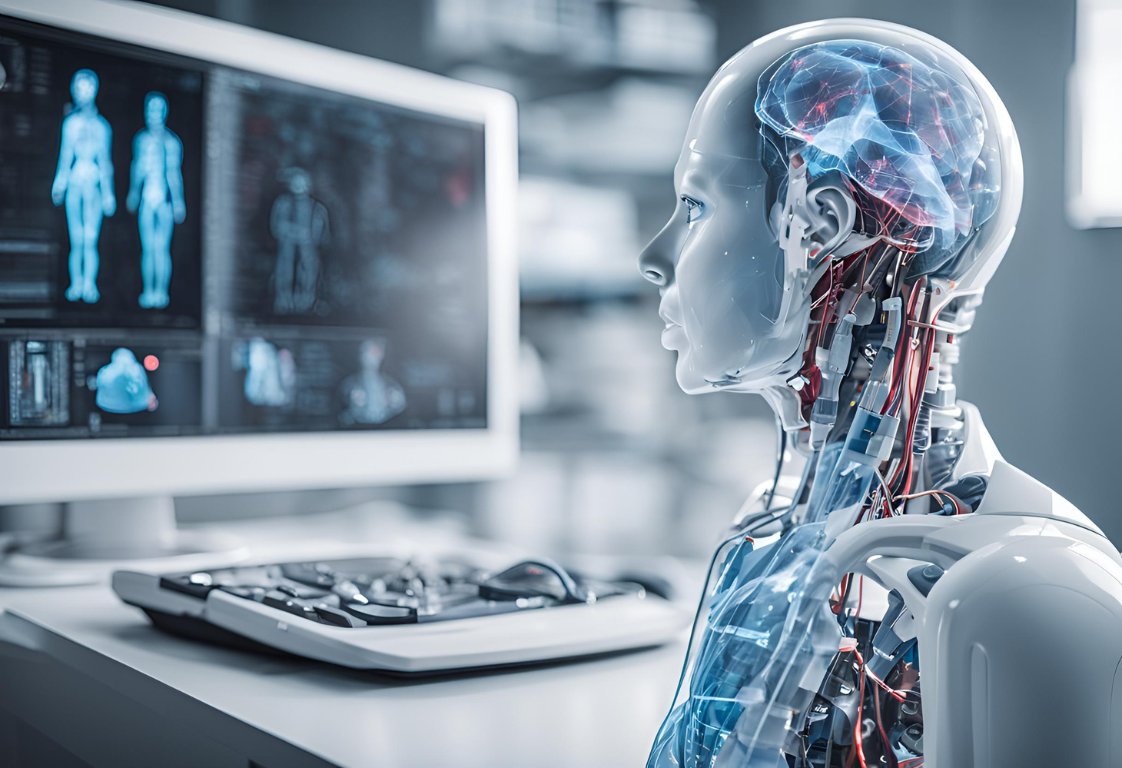Introduction
The AI Revolution in Healthcare: Breaking Boundaries and Saving Lives is not just a catchphrase—it’s a reality that’s reshaping the landscape of medicine as we know it. Imagine a world where diseases are detected before symptoms even appear, where personalized treatments are tailored to your genetic makeup, and where the inefficiencies of traditional healthcare systems are a thing of the past. This is the promise of artificial intelligence in healthcare, a revolution that’s well underway and making significant strides in improving patient outcomes, enhancing diagnostics, and streamlining healthcare delivery. Buckle up as we delve into how AI is breaking boundaries and saving lives in the most remarkable ways.

AI-Powered Diagnostics: A New Era of Early Detection
Artificial Intelligence is making waves in diagnostics, turning what was once the realm of human intuition into a field dominated by data-driven insights. AI algorithms can analyze medical images with astonishing accuracy, often surpassing human radiologists in detecting abnormalities such as tumors or fractures. This shift towards AI-powered diagnostics is not just about speed but also about precision.
Key Innovations:
- Machine Learning Algorithms: These can learn from vast datasets of medical images and patient records to identify patterns that might be missed by the human eye.
- Deep Learning: This subset of machine learning is particularly effective in analyzing complex patterns in medical images, leading to early and accurate diagnoses.
Real-World Impact:
AI’s ability to detect conditions like cancer at an early stage significantly increases the chances of successful treatment. For instance, AI systems have shown a remarkable capability in identifying breast cancer from mammograms, often with higher accuracy rates than human experts.
Personalized Medicine: Tailoring Treatments to Individuals
Gone are the days of one-size-fits-all treatments. AI is revolutionizing personalized medicine by enabling treatments tailored to an individual’s unique genetic profile, lifestyle, and health history. This shift is not just about enhancing the effectiveness of treatments but also about minimizing side effects and improving patient satisfaction.
Key Innovations:
- Genomic Sequencing: AI algorithms can analyze genetic data to predict how a patient will respond to certain treatments, leading to more targeted therapies.
- Data Integration: AI can combine data from various sources, including electronic health records and wearable devices, to create a comprehensive picture of a patient’s health.
Real-World Impact:
Personalized medicine powered by AI is already transforming the treatment of chronic diseases like diabetes and cancer. For example, AI-driven platforms can suggest the most effective drug combinations for cancer patients based on their genetic makeup.
Robotic Surgery: Precision and Efficiency Redefined
When it comes to surgery, precision is paramount. AI-powered robotic surgery systems are enhancing surgical precision, reducing recovery times, and improving patient outcomes. These systems allow surgeons to perform complex procedures with unprecedented accuracy.
Key Innovations:
- Robotic-Assisted Surgery: Robots equipped with AI can assist surgeons in performing delicate procedures, often through minimally invasive techniques.
- Enhanced Visualization: AI can provide surgeons with real-time data and high-resolution images, improving their ability to make precise incisions.
Real-World Impact:
Robotic surgery has already proven its worth in fields like orthopedics and neurosurgery. For instance, AI-assisted robotic systems have reduced the incidence of surgical errors and shortened hospital stays for patients undergoing joint replacement surgeries.
Predictive Analytics: Forecasting Health Trends
AI’s predictive capabilities are not limited to diagnostics; they also extend to forecasting health trends and potential outbreaks. By analyzing vast amounts of data, AI can predict trends such as disease outbreaks, patient admissions, and even the effectiveness of public health interventions.
Key Innovations:
- Epidemiological Modeling: AI can model the spread of diseases and predict potential outbreaks, enabling timely interventions.
- Patient Monitoring: AI systems can monitor patient data in real-time and alert healthcare providers about potential health crises before they occur.
Real-World Impact:
Predictive analytics powered by AI is transforming public health management. For instance, during the COVID-19 pandemic, AI models were instrumental in predicting outbreak hotspots and informing public health responses.
AI in Drug Discovery: Accelerating Breakthroughs
The drug discovery process is notoriously lengthy and expensive. AI is accelerating this process by analyzing vast datasets to identify potential drug candidates, predict their effectiveness, and streamline clinical trials.
Key Innovations:
- Machine Learning Models: AI can predict how different compounds will interact with biological targets, speeding up the identification of promising drug candidates.
- Data Analysis: AI algorithms can analyze clinical trial data to identify trends and potential issues, improving the efficiency of trials.
Real-World Impact:
AI has already contributed to the development of new drugs and vaccines. For example, AI was used in the rapid development of COVID-19 vaccines, significantly shortening the development timeline.
Virtual Health Assistants: Enhancing Patient Engagement
AI-powered virtual health assistants are revolutionizing patient engagement by offering personalized support, managing health inquiries, and aiding in chronic condition management.
Key Innovations:
- AI-Driven Chatbots: These virtual assistants provide round-the-clock support, answer health-related questions, and help schedule medical appointments.
- Remote Monitoring Tools: AI analyzes data from wearable devices to deliver real-time feedback, supporting patients in managing chronic conditions effectively.
Real-World Impact:
Virtual health assistants are making a significant impact by boosting patient engagement and improving adherence to treatment plans. For example, patients with chronic conditions can use AI-powered apps to monitor their health metrics and receive tailored advice, leading to better management of their conditions.
Ethical Considerations and Challenges
While AI offers incredible potential, it also raises several ethical and practical challenges. Issues such as data privacy, algorithmic bias, and the potential for job displacement in the healthcare sector need to be addressed.
Key Challenges:
- Data Privacy: Ensuring that patient data is secure and used ethically is a major concern.
- Algorithmic Bias: AI systems must be designed to avoid perpetuating existing biases in healthcare.
Real-World Impact:
Addressing these challenges is crucial to maximizing the benefits of AI in healthcare. Efforts are ongoing to develop ethical guidelines and regulations to ensure that AI technologies are used responsibly.
The Future of AI in Healthcare
The future of AI in healthcare is bright, with ongoing advancements promising even more transformative changes. From AI-driven personalized treatments to advanced diagnostics and robotic surgery, the possibilities are vast.
Key Trends to Watch:
- Integration with Genomics: AI’s role in genomics is expected to expand, leading to more personalized and effective treatments.
- AI in Mental Health: Emerging AI technologies are being developed to support mental health diagnosis and treatment.
Real-World Impact:
The continued evolution of AI in healthcare will likely lead to more efficient, personalized, and effective healthcare solutions, ultimately improving patient outcomes and reducing costs.
FAQs
1. How is AI currently being used in healthcare?
AI is used in healthcare for various applications, including diagnostics, personalized medicine, robotic surgery, predictive analytics, drug discovery, and virtual health assistants.
2. What are the benefits of AI in healthcare?
The benefits of AI in healthcare include improved diagnostic accuracy, personalized treatments, enhanced surgical precision, and more efficient drug discovery and clinical trials.
3. Are there any risks associated with AI in healthcare?
Yes, risks include data privacy concerns, algorithmic bias, and potential job displacement. It’s important to address these challenges to ensure responsible AI use.
4. How does AI improve diagnostic accuracy?
AI improves diagnostic accuracy by analyzing medical images and patient data to detect patterns and abnormalities that might be missed by human experts.
5. What future developments are expected in AI and healthcare?
Future developments may include further integration with genomics, advancements in mental health support, and more personalized and effective treatment options.
Conclusion
The AI revolution in healthcare is more than just a buzzword—it’s a transformative force that’s breaking boundaries and saving lives. From advanced diagnostics and personalized medicine to robotic surgery and predictive analytics, AI is reshaping how we approach healthcare. As technology continues to evolve, the potential for AI to further enhance patient outcomes and streamline healthcare delivery is boundless. Embracing these advancements while addressing the ethical and practical challenges will be key to realizing the full promise of AI in healthcare.

